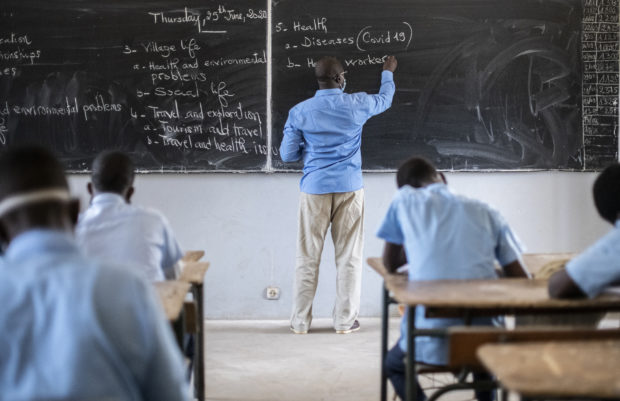JOHANNESBURG — Governments around the world should “remove all obstacles” to swift and equitable distribution of any successful COVID-19 vaccine, including by making all intellectual property and technologies immediately available, African countries said Thursday.

Senegalese students learn about health and the coronavirus during an English lesson as they returned to classes on the first day back after more than three months away, at the Sacre Coeur college in Dakar, Senegal Thursday, June 25, 2020. (AP Photo/Sylvain Cherkaoui)
The call from the African Union was Africa’s most assertive one yet for a “people’s vaccine” made available to everyone, even as rich countries like the United States make deals with manufacturers for potential supplies.
Using language that might put the pharmaceutical industry on alert, the African Union’s new communique specifically mentions the Doha Declaration on public health by World Trade Organization members in 2001, which refers to the right to grant compulsory licenses.
“Compulsory licensing enables a competent government authority to license the use of a patented invention to a third party or government agency without the consent of the patent-holder,” according to the World Health Organization.
The African communique, read out after a continental conference on the quest for COVID-19 vaccines, states that there’s an urgent need for countries to “make full use of legal measures … to ensure monopolies do not stand in the way of access.” It points out the “barriers” intellectual property posed in the past to affordable vaccines in developing countries.
The statement comes as the coronavirus spreads rapidly in Africa, with more than 337,000 confirmed cases.
Drug companies, however, have argued that they need to protect their intellectual property to fund their expensive research. Meanwhile, the World Health Organization supports a COVID-19 technology access pool where IP and data can be shared voluntarily.
African officials stress the shared approach.
The CEO of vaccines alliance GAVI, Seth Berkley, told the conference that “vaccine nationalism” is real, with initiatives in high-income countries “essentially trying to corner the market in those countries.”
“We are seeing some rich countries making deals with pharmaceutical companies to jump the queue” and obtain potential vaccines, UNAIDS chief Winnie Byanyima told the conference. “It’s not right that those who have money jump the queue while doctors and nurses in Africa die.”
She and others watched as it took years for Africa to have affordable drugs for HIV, which has a higher burden on the continent than anywhere else.
“Governments around the world should heed this powerful call,” Zain Rizvi, a law and policy researcher on access to medicine with the Washington-based consumer advocacy group Public Citizen, told The Associated Press in response to the African request to make all IP and technology immediately available.
“Nobody should be left behind. We cannot repeat the tragic history of delayed access to HIV treatment in sub-Saharan Africa, which cost millions of lives,” Rizvi said.
Also Thursday, the billionaire tasked with speeding up Africa’s access to critical medical supplies during the COVID-19 pandemic said he had to turn to China for testing kits after manufacturers in the West said the continent would have to wait for months.
Strive Masiyiwa told the African vaccine conference that testing kits “were available but only to the Western countries. … Abbott and them were saying, ‘You wait until September, wait until October.’ So I didn’t waste any time with them. I spent my time talking to the suppliers in China who were willing to supply immediately.”
And so, Masiyiwa added, “if a vaccine is available in the West but Africa has to wait a year to get it, I’m not going to be there, I’m going to be talking to those people who make that vaccine immediately available.”